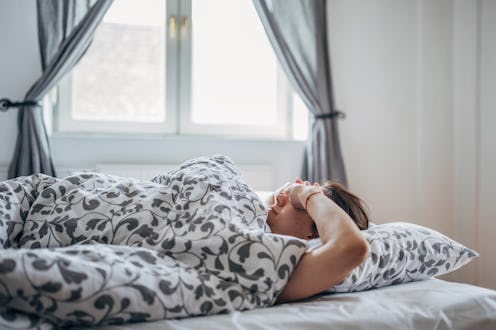Life
Why You’re Waking Up Early For No Reason, According To An MD

It's happened to all of us at some point or another; waking up after what feels like a good night's sleep, only to find that it's still the middle of the night. It can feel so frustrating to jolt awake hours before the alarm goes off, especially when you can’t get back to sleep. If you find yourself wondering why you're waking up early for no reason, there could be something your body is trying to tell you. And listening to it may help you fix the issue.
Disarranged routines, disruptions to your circadian rhythms, screen time, and stress can all make you wide awake hours before your alarm, says Dr. Seema Sarin M.D., director of lifestyle medicine at EHE Health.
A new routine, even one that has benefits in other ways, can make you suddenly wakeful in the mornings, she says. "Things can start slowly to creep up on you, making you lose track of time," she says. Without the "structural points" you're used to, she says, your waking and sleeping cycles might feel off.
Anything that messes with your circadian rhythms — the hormonal signals that tell your body when to wake up and when to feel sleepy — can also make you alert early in the mornings. Lack of light, Dr. Sarin says, is a particular issue. "Low levels of light can make your circadian rhythm go out of sync by reducing light-based cues," she says. Your body will wake up in response to light, so if you're living in a dark environment all the time — or suddenly get exposed to a flood of light at 3 a.m. — your brain's likely to going to get confused and jolt you awake.
"Stress, anxiety, and worry can also play a big part in influencing your sleeping pattern and could be the reason you’re waking up earlier," Dr. Sarin says. Anything from fears about finances to stress around relationships can make your sleep-wake cycle change, inducing insomnia or causing you to wake up earlier.
Racing thoughts, dwelling on worries, and stressing about the demands of the day ahead can also contribute to sleep maintenance insomnia, where you can fall asleep, but have trouble staying asleep. A common feature of the disorder is waking up too early without being able to doze off again, and it tends to affect women more often than men, especially as we get older. Certain brain chemicals that regulate our circadian rhythms and encourage deep sleep start to decrease in the wee hours of the morning, which is why early morning awakenings associated with sleep maintenance insomnia can be a little tricky to resolve.
People managing certain mental health conditions like depression, anxiety, PTSD, and bipolar disorder may also be prone to waking up too early. Addressing underlying emotional issues can be a helpful step in managing insomnia, and the National Sleep Foundation suggests that cognitive behavioral therapy for insomnia (CBTI) can help.
If you feel chronically tired on an ongoing basis, in addition to finding yourself awake before the sun's up, sleep apnea, a disorder where your breathing pauses in your sleep, could also be a factor. Many deal with the disorder without realizing that they have it. Sleep apnea is most likely to occur during the REM stage of sleep, when your muscles are paralyzed in order to prevent dreaming-induced physical movements. This muscle paralysis can also contribute to disrupted breathing patterns, which can cause too-shallow breathing and pauses in breaths. These breathing disruptions also lessen your quality of sleep, and can contribute to chronic early morning awakenings and insomnia.
Screen time can also be a factor in early morning waking. "Excessive screen time can have a detrimental impact on sleep by stimulating the brain and making it difficult to wind down," Dr. Sarin says. Light from electrical devices can keep the brain alert and aroused, even when it's time to rest. That can have a knock-on effect on your sleep patterns, she says, leading to the possibility of sitting up bolt upright at 2 a.m.
Identifying the underlying factors that may be contributing to your waking up too early is key to getting better sleep. Stress, mood and mental health disorders, and certain physical conditions can all present challenges to your sleep. Treatments like CBTI are shown to be super effective for treating insomnia without the use of sleep medication.
If you take medications for mental health management, make sure to check in with your doctor before making any changes to your treatment plan. Regardless of what the source of your sleep disturbances might be, awareness combined with effective treatments can help restore your sleep, and have you slumbering away in no time.
Expert:
Dr. Seema Sarin M.D.
Studies cited:
Blume, C., Garbazza, C., & Spitschan, M. (2019). Effects of light on human circadian rhythms, sleep and mood. Somnologie : Schlafforschung und Schlafmedizin = Somnology : sleep research and sleep medicine, 23(3), 147–156. https://doi.org/10.1007/s11818-019-00215-x
This article was originally published on